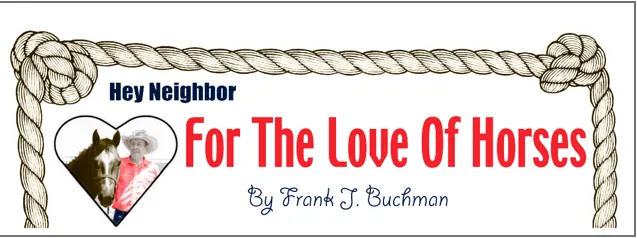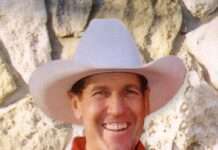By Frank J. Buchman
Old horses are quite like old people, and no two age quite the same, yet exercise physically and mentally as well as balanced nutrition generally attribute to longevity for both.
“The scientific community has defined the horse as physiologically showing signs of aging at 20 and older,” said Karyn Malinowski, horse management specialist.
“Still, no matter how spritely your senior might seem, he continues to age, and he will fare better if you detect and respond appropriately to aging’s effects,” Malinowski emphasized .
Aging horse, like humans, tend to lose lean body muscle mass and replace it with body fat, Malinowski said.
First, most horses over 20 have at least some arthritis. Carrying extra weight exacerbates that discomfort. “So, it’s important to keep your horse fit and in condition to keep weight off those joints, ” she said.
Second, as the body ages, it becomes more resistant to insulin, a hormone that’s responsible for controlling blood sugar levels by signaling fat, muscle, and liver cells to take up blood glucose and store it.
The healthy horse’s body responds to exercise by producing more of the hormone which mobilizes glycogen stores, “producing more glucose and refueling working muscles so the equine athlete can recover quickly,” Malinowski explained. “It also acts as an anti-inflammatory agent.”
Important to be careful when exercising an older horse in hot, humid weather. “His heart works harder, and old horses get hotter sooner than younger counterpart,” she said. “Even if the horse is sweating appropriately, he cannot go as long or as far.”
“An old horse’s ability to respond to infection or disease is not what it was. Keep any unfamiliar horse well away from your older horse, both in the barn and on turnout, and never share equipment such as water buckets, or tack,” . Malinowski advised.
“Older horses do respond to vaccine for influenza, but not for as long as a younger horse and not to the degree of antibody production,” Malinowski said.
Giving older horses routine vaccinations in the spring, with possibly a booster for things such as encephalitis in the late summer to early fall as well, just as a preventive was recommended.
Malinowski advocated regular deworming older horses with variation in types.
What’s appropriate for an aging horse’s diet depends on the individual, Malinowski said, but most horses should have their teeth checked at least annually, or maybe more often.”
Many horses can be maintained on whatever diet they’ve been on for their whole lives, she said.
Those chewing and then dropping food, rather than swallowing, slower eating, and with weight loss might need their food processed into a gruel or slurry to make nutrients more accessible and prevent choking.
“There’s no substitute for good-quality fiber roughage in the diet, no matter how old the horse. You may just have to accommodate, as to what type of fiber,” she said.
“Senior feeds are hay, grain, minerals, and whatever else the horse needs, ground up and formed into pellets that dissolve in the mouth, with no need to be chewed any more. You can stretch the life span of a horse well beyond the point where he doesn’t have any teeth by feeding correctly,” Malinowski said.
“Adult teeth, which continue to erupt slowly from the gum as they wear, normally last a lifetime, but very old horses might have so little of one or more teeth left that they’re loose in the gums and, need to come out which improves horse chewing and consumption,” Malinowski said.
“As long as you feed your senior an appropriate diet,” said Malinowski, “you probably don’t need to supplement vitamins and minerals; good forages and most supplemented grain diets include these.”
However, a horse on a restricted-grain diet may need some kind of ration balancer to make sure he’s getting the recommended level of vitamins, particularly when hay quality is less than ideal, she explained.
“Keep in mind that if you’re oversupplying vitamins and minerals, the only thing you’re really doing is making very expensive urine, because horses eliminate what they don’t need,” Malinowski insisted.
Additionally, note how your older horse maintains body weight and condition in the chill of winter and the heat of summer. “Older horses are stressed more in both cold weather and hot weather,” Malinowski said. These extremes might dictate adding calories to senior horses’ diets.
“Even the healthiest older horse can’t live forever. But, you’ll give yours the best chance of living comfortably for as long as possible, if you keep track of how his body is changing, stay in contact with your veterinarian, and remain alert for signs of ADR: ain’t doin’ right.
“If horses are not their normal selves, that’s when to start looking for what’s going wrong,” Malinowski said. “They always tell you.”



